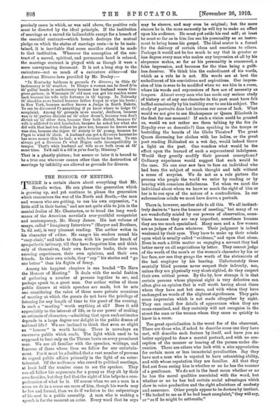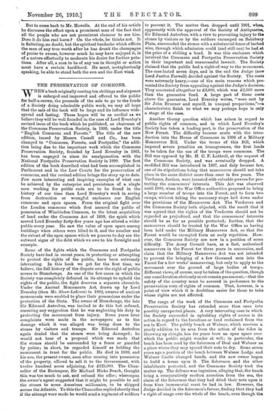1.11.6 HONOUR. OF MEETING.
rERE is a certain charm about everything that Mr. Howells writes. He can please the generation which is growing up, and yet continue to please the generation which remembers the war of the North and South,—the men and women who are getting, to use his own expression, "a little stiff in their tastes," and are not quite able to join in the mental frolics of Mr. Chesterton, or to tread the long word- mazes of the American novelist's ever-youthful compatriot and contemporary, Mr. Henry James. His last volume of essays, called "Imaginary Interviews" (Harper and Brothers, 7s. 6d. net), is very pleasant reading. The author writes in his character of editor. He ranges his readers round his "easy-chair," and talks to them with his peculiar knack of sympathetic intimacy, till they have forgotten him and think only of themselves, their own favourite books, their own amusing experiences, their own opinions, and their own friends. In their own minds, they " cap " his stories and "go one better" than his flights of fancy.
Among his happiest chapters is one headed "To Have the Honour of Meeting." It deals with the social fashion of gathering a number of persons together to see, and perhaps speak to, a great man. Our author writes of those public dinners at which speeches are made, but he sets one considering the value of those more private occasions of meeting at which the guests do not have the privilege of listening for any length of time to the guest of the evening. Is such a " meeting " worth anything at all P Does it add appreciably to the interest of life, or to our power of making an estimate of character,—admitting that upon such estimates depends in a large degree our delight in the public drama of n ational life ? We are inclined to think that oven so slight an " honour " is worth having. There is nowadays an enormous public which reads. The light which used to be supposed to beat only on the Throne beats on every prominent man. We are all familiar with the speeches, writings, and features of those whose lives we follow for our entertain- ment. For it must be admitted that a vast number of persons do regard public affairs primarily in the light of an enter. tainment. Of the audiences who crowd to political meetings, at least half the number come to see the speaker. They can all follow his arguments for a penny as they sit by their own firesides, but they feel that the sight of him helps to a com- prehension of what he is. Of course when we see a man in a room we do in a sense see more of him, though his words may be few and formal, than we do if we listen to the outpourings of his soul in a public assembly. A man who is making a speech is for the moment an actor. Every word that he says
may be sincere, and may even be original; but the more sincere he is, the more earnestly he will try to make an effect upon his audience. He must put aside his real self; at least he must so far as in him lies use his personality as an instru- ment to bring home his gospel. The ideal orator is a funnel for the delivery of certain ideas and emotions to others. Perhaps it would not be too much to say that in greater or less degree every man who makes any impression at all by his eloquence makes, so far as his personality is concerned, a false impression, and becomes for the time being a guilt- less deceiver. We think him the embodiment of his words, which as a rule he is not. His words are at best the embodiment of his convictions and aspirations. Our impres- sion of him is sure to be modified when we see him in a room, where his words and expressions of face are of necessity es tempos-c. Almost every man who has made any serious study of history or of any one character in the past must have felt baffled occasionally by his inability ever to see his subject. The study of portraits does but increase our sense of lack. What would we not give to see Shakespeare or Queen Elizabeth in the flesh for one moment! If such a vision could be granted us, would we not rather see them talking by the fire (is Royalty ever so domestic?) than speaking to the troops or bestriding the boards of the Globe Theatre ? The great Queen discussing her clothes with her ladies, or the great poet reading Holinehed on a wet day, would indeed throw a light on the past. One wonders what would be the effect upon the learned of such a supernatural indulgence. Would they greatly modify their present conceptions ? Ordinary experience would. suggest that such would be the case. No one ever saw face to face an individual who bad been the subject of much thought and talk without a sense of surprise. We do not as a. rule picture the persons who people the world we enter by reading or by hearing with conscious definiteness. Yet when we meet the individual about whom we know so much the sight of him or her is to our eyes of the nature of a. contradiction. In our subconscious minds we must have drawn a portrait.
There is, however, another side to all this. We all instinct- ively desire to "have the honour of meeting," but many of us are wonderfully misled by our powers of observation, some- times because they are very imperfect, sometimes because they are too much specialised. Many men and a few women are no judges of faces whatever. Their judgment is indeed weakened by their eyes. They have to make up their minds upon what is usually called "evidence," and upon that alone. Even in such a little matter as engaging a servant they had better carry on all negotiations by letter. They cannot judge of the worth of the man's or the woman's character by his or her face, nor can they gauge the worth of the statements of the last employer by his bearing. Unfortunately these mentally blind persons never suspect their infirmity, nor, unless they are physically very short-sighted, do they suspect their own critical power. By the by, how strange it is that certain persons whose physical sight is very defective can often give an opinion that is well worth having about those whom they have met but once, and with whom they have exchanged no words of the slightest significance. They gain some impression which is not made altogether by sight. They can recall few details of appearance when they are cross-examined, and they certainly will not recognise in the street the man or the woman whom they came so quickly to know in a room.
Too great specialisation is the worst foe of the observant. There are those who, if asked to describe some one they have met, will describe each feature by itself, and leave you no better equipped to draw a mental portrait, and with no con- ception of the manner or bearing of the person under dis- cussion. There are others who look with a nice appreciation for certain more or less immaterial peculiarities. Say they have met a man who is reputed to have astonishing ability, and with whose reputation they are familiar. All that they find out from seeing him is whether or no he has the manner of a gentleman. We do not in the least mean whether or no he has the moral qualities associated with the word, but whether or no he has had certain social advantages which show in voice production and the right admixture of modesty and assurance. Other people appear to be doctors by instinct. "He looked to me as if he had heart complaint," they will say, or "as if he might be asthmatic."
But to come back to Mr. Howells. At the end of his article he discusses the effect upon a prominent man of the fact that all the people who are not prominent clamour to see him. Does it do him real harm P On the whole, be thinks not. It is flatteihig, no doubt, but the spiritual headache which afflicts the man of any true worth after he has drunk the champagne of praise to excess, however much he may have enjoyed it, is of a nature effectually to moderate his desire for further pota- tions. After all, a man to be of any use in thought or action must have a certain hardihood. He must, metaphorically speaking, be able to stand both the sun and the East wind.



















































 Previous page
Previous page